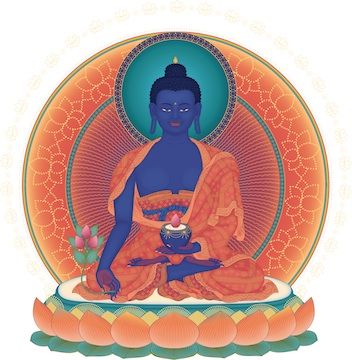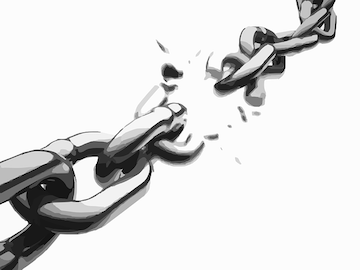The Four Noble Truths ~ The Third Noble Truth
The Noble Truth of the Cessation of Suffering (dukkha-nirodha)

The four noble truths in Buddhism are at the core of the Buddha’s teachings. It encompasses the truth about why we suffer and what it is, what causes this suffering and where it originates. There is a way to get rid of the suffering and it’s causes. There is a noble way of practices to be followed that will lead to the cessation of suffering and to a taintless way of being that is no longer bound to the suffering way of life and becoming.
After understanding suffering and the cause of suffering discussed in parts 1 and 2, the next step is to figure out what the ending of suffering is about:

Whatever was mentioned in the posting for the Second Noble Truth, here it has to be given up and outright rejected in order to get rid of the arising of suffering:

“And what is the cessation of suffering?
It is the fading away and ceasing [without remainder], the giving up, relinquishing, letting go, and rejecting of craving.” — MN I.49

When compared with medical science, the Four Noble Truths follow the same line of thought when it comes to the discipline of a disease [suffering], diagnosis [the arising and cause of suffering], the cure [the cessation of the causes] for the disease, and the medicine [the Noble Eight-fold Path] to take for it.

In the Buddhist view, the Third Noble Truth would be the cure. The discontent towards suffering is primarily stated in schematic utterances in the teachings, but it is sensible to review them one-by-one and try to understand what each cessation is explaining, and the relation to the next item in the chain of suffering:

“And what, monk, is the noble truth of the cessation of suffering?

with the cessation of birth, old age and death, sorrow, lamentation, pain, dejection, and anguish cease.
Such is the cessation of this whole mass of suffering.” — AN I.177
Craving and ignorance stand out as the two things to relinquish, the former being addressed through the teachings and practice of discipline, and the latter through the increase of wisdom and realization.

The spiritual practice of Buddhism stresses the cessation of identifying with the body and the fleeting mind, or in more direct terms, the projecting of individuality [self-identity] onto the body and the false perception of the satisfying nature of feeling pleasurable sensations. The problem lies in the fact that the impulses can’t be satisfied nor prolonged, and that depending on them reveals the false nature of the experience itself. The perpetual flux of becoming has no end unless you step out of the merry-go-round. Our bondage is the result of ignorantly seeing the self in what is not our self (anattani attanam), but only a process and flux of momentariness.

The Asankhatasamyutta explains what the destination is and the path leading to the destination. This is not some location to be driven to, or a destination in the mind, but rather a state of mind:

“And what, monks, is the destination? The destruction of lust, the destruction of hatred, the destruction of ignorance: this is called the destination.” — SN IV.373
the Suttanipata, the difficulty of the task at hand to understand the teachings is clear, as well as lust for existence [becoming] needs to be ceased:

In the next part we’ll be discussing the Fourth Noble Truth.

I will flag comment spam at 1% strength. If you keep on spamming my post, I will flag you at 100%. I don't care if you have limited English abilities, write a couple of sentences about this article, no copy-paste, please. I will flag: one sentence comments, links to your blog and begging for up-votes and follows. Also, I will flag comments that have nothing to do with my blog's article. I will also check your comment section to see if you have been comment spamming on other blogs.


 A link to My Blog
A link to My Blog
The very first noble truth of the Buddha points out that suffering is inevitable for human beings as long as we believe that things..
The truth is if we cling to what is constantly changing as me or mine we create stress, this is suffering.
Very interesting post i mean buddhism is a way of live and we have many things to learn of it, in my case i can learn a lot of each of your posts. Regards
Depending on how you look at Buddhism, it can be a way of life, medicine for what ails you, a philosophy, or a religion...just be careful how you grasp the teachings, they are like sharp edged grass, when cut currectly act as a nice cushion to sit on.... but when pulled with the bare hand at the wrong angle the grass can cut you!....hahahaha Thank you @dim753
It's true i mean i like the concepts of buddhim to mantain a good karma around you :). Regards
that suffering is all from ourselves that does not maintain balance in our lives. thanks @reddust
Some suffering isn't our fault, like birth, illness, death, accidents that aren't our fault, the economy goes to crap, relationships may fail from no fault of your own...you know life happens...but how we react to this life stuff causes a doubling up of suffering, this is the stress this article is talking about...especially the grasping of our constantly changing body and mind as self...
i am also buddhist. i am so glad about your post.The third noble truth from four noble truth is stop of sorrow.If someone want to stop sorrow,he has to stop first desire.
never we have to take This is mine, that is the mine like that.The loard buddha was saying " if some one like to understanding about buddhism, he has to understand four noble truth.immediately we can't stop desire.
Step by step we can try and do it.Desire have 3 points. first is lustfulness, second is desire to live,third is Potential desire.
Nice to meet you @templeflower, the 4 Noble Truths and the 8fold Path were my first lessons from my first teachers. I am glad you liked my post.
Just now i saw your message.so sorry for late reply. I am so happy about you. Because of you have very good knowledge about Buddhism.Again i am so happy
I actually lived with Tibetan Buddhists early this year for four weeks, so beautiful to see these truths lived out in each daily action :)
That is so cool @eoincurran, where were you located? Which School did they belong too? My teachers are Nyingma and Karma Kagyu. One of my favorite teachers who taught me Medicine Buddha is Khenpo Sonam, sweetest man I've met but his lessons kick ass, very humbling working for him...hahaha
http://www.riwoche.com/SonamRinpoche.html
It was in Queensland, Australia but I am now home in Ireland. They were Mahayana Tibetan buddhists of the Sakya tradition. I met Lama Choedak Rinpoche who was leading a family retreat, one of the funniest men I have ever met with great energy durinmg his teachings. I was a volunteer so I really got to see how they really live.
I am not super into Buddhism but this was a really great experience!
I made a video about what I did during my trip if you are interested. :)
Lust for existance is the upmost sacred value of the entire western culture today , experiencing as much as possible , treading to a path to imagined greatness. Giving that up is very challenging. Thank you for this great lesson
@eugenekul, without the lust for existence those who make profits from our suffering would be out of business ... ;-)
@reddust, You nicely explained third part of four noble truths.This time you explained about dukkha-nirodha. only has one step to describe next blog. Totally appreciated your effort, That's priceless effort.Perfect contribution with examples.
Thank you @madushanka, I try and make these posts clear and simple, one more truth and we are on to Dependent Origination, which is my favorite teaching and related to my vipassana mediatation practice.
It sounds like it's all interwoven as one thing affects another and another. Indeed it's complicated but so is our world as our worlds intertwined thanks for sharing @reddust
All the teachings are interconnected @enjoywithtroy, you said the same thing I said to my teacher.
It is possible to reach Nirvana only after the end of the suffering is about. Thank you best share. @reddust
Yes @turkishcrew, the goal is nibbana, this is what the Theravada tradition states.
is that the ultimate truth?
All four of the truths are the ultimate truth regarding self caused suffering, however the ultimate truth is the realization of the 4 noble truths. The relative truth is how people and things appear to exist, however the ultimate truth is that existence is a mere process of physical and mental phenomena in which no permanent individuality can be found.